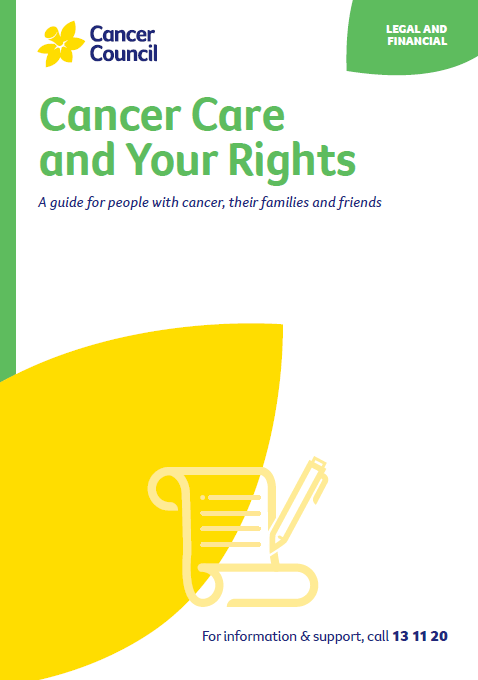- Home
- About Cancer
- Coping with a diagnosis
- Cancer care and your rights
- Key questions about your health care rights
- How does the Australian health care system work?
How does the Australian health care system work?
Understanding how the health system works can help you find care that works best for you. Learn more about navigating the health care system.
 Public hospitals
Public hospitals
- Funded by governments.
- If you are admitted as a public patient, medical care is free (although there may be a cost for some medicines).
- Often have a wider range of services than private hospitals.
- May also have some private services, such as imaging and pathology.
- You will not be able to choose your doctor and there may be a wait for some services.
- If admitted as a private patient, some costs may be covered by your private health insurance, but there are likely to be out-of-pocket costs.
- Learn more about public health care.
 Private hospitals
Private hospitals
- Run by private organisations.
- Treatment may be partly covered by Medicare and private health insurance.
- You will have to pay part of the cost for medical services (gap payment).
- May be additional costs for accommodation, operating theatres and medicines.
- You will be able to choose your doctor.
- Waiting times for some health services may be shorter than in a public hospital.
- Learn more about private health care.
 Non-hospital care
Non-hospital care
- Mostly private, though some public services.
- If you visit a doctor outside a hospital, Medicare will pay 100% of the schedule fee for general practitioner (GP) visits and 85% for specialist visits, and approved imaging scans and blood tests.
- Many health providers charge more than the schedule fee and you will have to pay the difference. Ask how much you will have to pay when making an appointment.
- Private health insurance does not cover out-of-hospital medical service costs, which are covered by Medicare.
 Medicare
Medicare
- Funded by Australian taxpayers.
- Covers the cost of treatment in public hospitals, and partly covers doctors’ fees for some services in private hospitals.
- Helps to cover part of the cost of visits to GPs and specialists.
- Once you have spent a certain amount on medical services, your benefits may increase (Medicare Safety Nets).
- Sometimes, health professionals accept the Medicare benefit as full payment for a service (bulk-billing).
- Learn more about Medicare.
 Private health insurance
Private health insurance
- You may choose to pay for private health insurance.
- If you have hospital cover, it will cover part of the cost of your care as a private patient.
- You will usually also have costs you have to pay yourself.
- If you have extras cover, it may help with the cost of allied health care such as physiotherapy.
- Learn more about private health insurance.
 Gap payments
Gap payments
- Medical costs are often higher than the amounts covered by Medicare and private health insurance.
- The difference between these amounts is called a gap payment or out-of-pocket cost and you will have to pay this. Check with your health care team what your gap payments will be.
- Learn more about medical costs.
 PBS
PBS
- Funded by the Australian Government, the Pharmaceutical Benefits Scheme (PBS) covers part of the cost of medicines.
- Once you have spent a certain amount of money on medicines, your medicines are free or the cost is further reduced (the PBS Safety Net).
→ READ MORE: Navigating the health care system
Podcast: Coping with a cancer diagnosis
Listen to more of our podcast for people affected by cancer
More resources
Prof Sarah Lewis, Faculty of Medicine and Health, The University of Sydney, NSW; Kevin Bloom, Senior Social Worker, Haematology and Bone Marrow Transplant, Royal North Shore Hospital, NSW; Danielle Curnoe, Consumer; Alana Fitzgibbon, Clinical Nurse Consultant – Gastro-Intestinal Cancers, Cancer Services, Royal Hobart Hospital, TAS; Hall & Wilcox (law firm); Johanna Jordaan, Consumer; Dr Deme Karikios, Medical Oncologist, Nepean Cancer and Wellness Centre, Nepean Hospital, NSW; Melissa Lawrie, Breast Cancer Clinical Nurse, Cancer Services, Gold Coast Hospital and Health Service, QLD; Jacqueline Lesage, Consumer Reviewer, Cancer Voices NSW; Andrew Potter, Consumer; Siân Slade, PhD Candidate, Nossal Institute for Global Health and Non-Executive Director (health, disability sectors), VIC; Paula Watt, Clinical Psychologist, WOMEN Centre, WA.
View the Cancer Council NSW editorial policy.
View all publications or call 13 11 20 for free printed copies.

